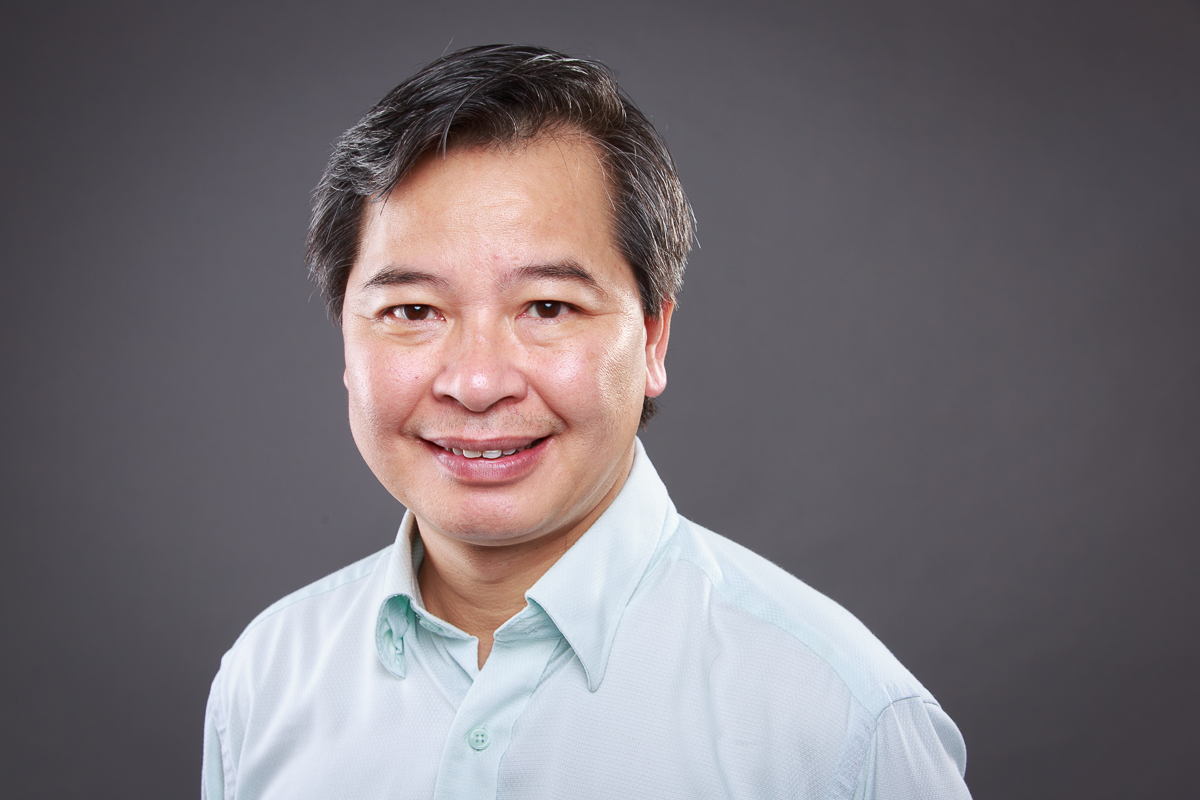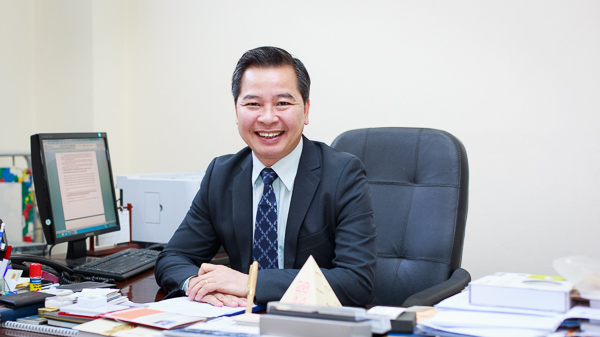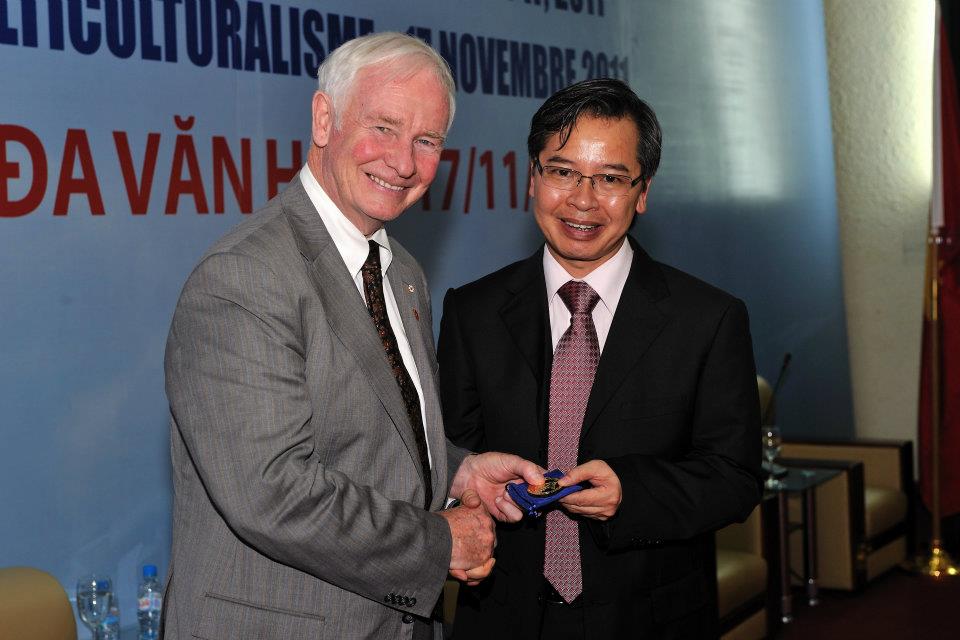From a homeland rich in historical traditions to Soviet Russia.
Associate Professor Pham Quang Minh was born and raised in Ninh Giang district, Hai Duong province, a rural area in the Northern Delta. His homeland is a land steeped in history, with the famous Luoc River, connecting the Red River with the Thai Binh River, which has been immortalized in the poetry of Nguyen Du:The Luoc River flows eastward, its waters constantly flowing without turning back.In particular, this land is also the cradle of many famous and heroic figures, most notably the military governor Khuc Thua Du, who laid the foundation for the independence of the Vietnamese nation (905-907) after nearly 1000 years of Chinese rule. Ninh Giang is not only rich in historical traditions but also famous for its sweet and flavorful sticky rice cake, a local delicacy that everyone wants to try at least once. Proud of its historical and cultural traditions, Associate Professor Dr. Pham Quang Minh also knows how to quickly innovate and integrate with the region and the world, thereby making his lectures and scientific research topics both deeply rooted in history and modern and innovative.

Associate Professor, Dr. Pham Quang Minh
Born in 1962, he grew up during a time of war and division, making education extremely difficult. Driven by a thirst for knowledge and partly due to a lack of supervision at home, from the age of five, young Pham Quang Minh would "tow" to his older brother to class, becoming an unofficial member of the group without even realizing it. Even now, he can never forget the first-grade class that had to be evacuated to the village temple, with bomb shelters dug under the desks so students could hide there at any time when American planes arrived. Lessons were constantly interrupted, and the atmosphere was always tense, as students had to concentrate on the lecture while listening for air raid sirens with the other. Besides school supplies, the only things they had to carry were a straw hat and a woven straw circle to wear on their backs, which people in Ninh Giang at the time called a "straw sling," to protect against shrapnel from American bombs.
Despite living in difficult circumstances, Pham Quang Minh was always diligent, persevering through hardships and consistently achieving high academic results. In 1978, at the young age of 16, he became the youngest student in the K23 class of the History Department at Hanoi University. After one year of university, thanks to his outstanding academic and training achievements, he was sent by the university to study world history in the Soviet Union. He officially arrived in Russia in the autumn of 1980 and completed a one-year preparatory course at Moscow State University. A year later, he returned to study at Kuban State University in Krasnodar, in southern Russia, near the famous Black Sea. To this day, he still considers his six years of study in the Soviet Union (1980-1986) to be the best time for him to fulfill his academic dreams. The beautiful country of Russia, with its friendly, gentle, and kind people, coupled with his pride in his homeland, helped him overcome difficulties and challenges, achieve excellent academic results, and accumulate valuable experience for his future career. In 1986, he graduated from university with honors and was assigned to work as a lecturer at the History Department of Hanoi University, the very university that had sent him to study there.

He is an expert on international politics and Vietnam's foreign policy.
In his early days at Hanoi University, despite facing numerous difficulties, some seemingly insurmountable, young lecturer Pham Quang Minh demonstrated unwavering dedication, commitment to his work, a thirst for knowledge, and continued striving thanks to the support of his colleagues. A notable difference in his character was that, starting in the late 1980s, in addition to his professional work, Pham Quang Minh quickly began studying English at the evening language center located at Trung Vuong High School. He vividly remembers those afternoons in 1988-1989, when while others rested or went out after a day's work, he had to "work and study at the same time." He discovered that while teaching Russian at the Trung Vuong Language Center to make ends meet, he could learn English there for free because the center prioritized its employees. So, from 5 PM to 7 PM, he was a Russian language teacher, and from 7 PM to 9 PM, he was an English language student. After two long years of juggling both teaching and student, enduring hunger and power outages, his efforts finally paid off: he received a B-level English certificate. Not stopping there, he enrolled in the part-time English program at the Hanoi University of Foreign Languages. After a year of hard work and hardship, even having to sell his belongings to pay for his studies, he passed the C-level English exam at the Hanoi University of Foreign Languages. He often jokingly calls it his "most valuable" certificate.
Raised in the Federal Republic of Germany
In September 1991, with his accumulated work experience and outstanding English language skills at the time, he received a scholarship to study for a Master's degree in Southeast Asian History in Germany, with two minors: Political Science and European History. He can never forget his first day at Dueselldorf airport in the then-reunified western part of Germany, when he didn't know a single word of German. But with his high adaptability and integration skills, after only a year of intensive study, he passed the German Language Proficiency Test (PNDS), allowing him to study at German universities.
In July 1992, he went to study at the University of Passau, a small but incredibly beautiful city nicknamed "the meeting place of three rivers"—the Inn, the Ilz, and the Danube—in the State of Bavaria (Germany), about 180km southwest of Munich. This was where he had the opportunity to experience an advanced, modern, open, and interdisciplinary education. The high standards, emphasis on quality, and the fact that the course was conducted entirely in German, coupled with the fact that most of the learning materials were in English, presented significant challenges for a foreign student. However, he overcame all these obstacles and successfully achieved his goals. As a result, in 1996, he returned to his home country with a master's degree with honors and immediately began contributing to the establishment of the then-new University of Social Sciences and Humanities. In his capacity as Head of the External Relations Department, along with his colleagues and the experience accumulated during his studies abroad, he built and developed international cooperative relationships, opening up many opportunities for future collaboration for the University.
However, he recognized the importance of continued training and professional development. Therefore, after three years of work, in 1999 he applied for and was honored to receive a full scholarship from the German Academic Exchange Service (DAAD) to fund a doctoral program in Germany. With his existing knowledge and experience, and with the dedicated guidance of his professors, after only three years he received his PhD with honors from Humboldt University, a leading university in the world, named after Humboldt, a renowned university and educational reformer of the 19th century in Germany. Founded in 1810, this university is recognized worldwide as the "midwife" of modern research universities. Humboldt University's spirit of liberal arts and science has inspired universities around the world, from Europe and Asia to America. It can be said that while Phạm Quang Minh learned a systematic and structured approach during his time in Russia, his studies in Germany taught him logical thinking, critical thinking, honesty, and a high level of discipline.
His doctoral dissertation was on the topic of "Between theory and practice: Agricultural policy in Vietnam from 1945 to the present.The dissertation was highly regarded for its theoretical and practical significance. It successfully utilized a vast amount of original source material from archives at both central and local levels, providing authentic and vivid insights into Vietnamese history and politics. Approaching the subject from an interdisciplinary perspective of history, political science, and sociology, the dissertation addressed a vital issue for Vietnam: agriculture, farmers, and rural areas, while also offering suggestions for policy and practical development in less developed countries. Specifically, the dissertation reached the following conclusions.The firstThe thesis argues that Vietnam's development history depends primarily and first and foremost on addressing rural issues. Formulating correct, timely, and appropriate policies is crucial, but how those policies are implemented is equally important. Research has shown a significant gap between theory and practice in Vietnam's development, and the success or failure of policies depends heavily on the local officials.MondayWhile most policies are enacted "from the top down," many are also born from "bottom-up" initiatives. It is the farmers themselves, with their experience, knowledge, and strength, who have created miracles and are truly the masters of their land. The land reform of the 1950s, agricultural collectivization in the 1960s and 1970s in the North, agricultural collectivization in the South in the 1970s and 1980s, and the process of innovation and granting land use rights to farmers in the 1990s are vivid examples of the development of rural Vietnam. The important thing is that policymakers must understand the reality, consider carefully, and make timely decisions that are in line with the people's will.TuesdayIn reality, with the current low average amount of agricultural land per capita, farmers cannot possibly secure their livelihoods. At the same time, the fragmentation and dispersion of land also hinders investment, mechanization, and modernization of agriculture, resulting in low productivity. To this day, the conclusions of this thesis remain highly relevant.
After successfully defending his doctoral dissertation at Humboldt University in 2002, his thesis immediately attracted the attention of researchers both domestically and internationally. Based on this research, Dr. Pham Quang Minh was invited to present his first paper at the International Scientific Conference entitled “Vietnam Update,” organized by the Australian National University (ANU) on the topic of “Local Government in Vietnam.” There, he presented a paper entitled “Between Theory and Practice: Local Government in Hai Duong Province.” This paper was published in Singapore in 2003 in the book “Beyond Hanoi: Local Government in Vietnam,” edited by Professor Ben T. Kerkvliert and Professor David Marr.
In 2002, Dr. Pham Quang Minh was appointed Deputy Head of the Department of International Studies, University of Social Sciences and Humanities, and was assigned to teach and research a new field: politics and international relations of the region and Vietnam. With a solid foundation of knowledge acquired from Russia and Germany, he quickly learned, absorbed, and mastered this new field. He has led numerous scientific projects, compiled many textbooks and lecture notes, supervised many dissertations and theses, and presented hundreds of scientific papers at domestic and international conferences from the USA, Germany, France, China, Singapore, Thailand, Japan, and South Korea. He is a frequent presence at international scientific forums. To date, he has published four books and over 70 articles in scientific journals, including more than 20 articles published abroad in several prestigious scientific journals of Oxford University, Berkeley University, Stanford University, and many other publishers. In 2007, he was awarded the title of Associate Professor in History.

Associate Professor Pham Quang Minh received a medal from the Governor General of Canada, David Johnston, for his contributions to promoting Canadian studies in Vietnam (November 2011).
"Perseverance is the key factor.
That was the sincere sharing of Associate Professor Pham Quang Minh when he commented on the reasons for success in scientific research. For him, the main motivation for conducting scientific research is his passion and perseverance, pursuing what he desires and contributing to the overall development of the country. Associate Professor Pham Quang Minh once said:"For me, the only choice was to stay committed to teaching, to the school where I took my first steps at the age of 16 and where I have since guided generations of students. To this day, it remains a correct and wise choice."It can be said that his scientific research process was closely related to and mutually influential with his teaching career. For him, only on the basis of good scientific research could a teacher deliver excellent, engaging lectures, imparting useful knowledge to students. Conversely, during teaching and presentations, the questions, concerns, and desires of students were the driving force that motivated him to continue pursuing new research topics.
Since 2006, as Head of the Faculty of International Studies, University of Social Sciences and Humanities, Vietnam National University, Hanoi (a faculty newly established in 1995), he has worked tirelessly with his colleagues to gradually build the Faculty into a strong unit for training and research, both domestically and internationally, and a trusted institution for society. For his contributions and capabilities, in 2012, he was appointed Vice-Rector of the University of Social Sciences and Humanities, in charge of scientific research and postgraduate training.
When discussing the research direction of Associate Professor Dr. Pham Quang Minh, one must mention topics that are highly topical, historically valuable, innovative, and aligned with international integration. His scientific research focuses primarily on issues such as: International relations in the Asia-Pacific region; Vietnam's international policy and relations; and Comparative political science. His representative scientific research topics over the years include:Regionalism: Theoretical and Practical IssuesFunded by the National Foundation for Science and Technology Development (NAFOSTED); Projects "The formation of a new security architecture in the Asia-Pacific region and its impact on Vietnam."; ""The Formation Process of Vietnam's Innovative Foreign Policy from 1986 to the Present"; "The Vietnam-Soviet Union-China Triangular Relationship in the Anti-American War 1954-1975"; "Reforms in Siam and Vietnam in the Late 19th and Early 20th Centuries: Reasons for Success and Failure"All funding was provided by Hanoi National University. In addition, he also chaired a project of the city of Hanoi.The main solutions for developing Hanoi's external information activities by 2020."In particular, he also conducted several research projects in collaboration with foreign scholars, such as:In search of an ASEAN Identification”(Searching for ASEAN Identity) is funded by the Nippon Foundation, Japan;The EU through the Eyes of Asia”(The European Union through the eyes of Asia) is funded by the Asia-Europe Foundation.
For his contributions to training and scientific research, Associate Professor Dr. Pham Quang Minh has received numerous awards both domestically and internationally. These include the Medal from the Governor General of Canada, David Johnston, for his contributions to promoting Canadian studies in Vietnam during his state visit to Vietnam on November 17, 2011; and the 2007 Best Book Award."The reform movement in some East Asian countries in the mid-19th to early 20th centuries" (Professor Vu Duong Ninh, editor).(Vietnam National University, Hanoi Publishing House 2007); Vietnam National University, Hanoi Outstanding Scientific Work Award 2012:"Vietnam's Foreign Policy of Innovation 1986-2010"World Publishing House, 2012.
To achieve success in his scientific research, Associate Professor Dr. Pham Quang Minh overcame many difficulties and challenges with unwavering passion for historical science. He is a role model of scientific creativity and keen awareness of current issues in the country and the world. His secret to success lies in his humility, constant learning, and interaction with experts domestically, regionally, and internationally. Through his research, Associate Professor Dr. Pham Quang Minh wants to remind everyone to cherish, preserve, and promote the cultural and historical values of the nation, while also keeping pace with the trend of openness, innovation, and integration with the region and the world.
|
ASSOCIATE PROFESSOR, DR. PHAM QUANG MINH
+ Workplace: Department of International Studies (2002-2012). Board of Directors (2012 to present) + Management position: Head of the Department of International Studies (2006-2012). Vice Principal (2012 to present).
Learn about the world's political systems.Political-Administrative Publishing House, Hanoi 2010. Vietnam's innovative foreign policy 1986-2010,World Publishing House, Hanoi 2012. International relations in the Asia-Pacific region,Hanoi National University Publishing House, Hanoi 2015. Teaching International Relations of Southeast Asia in Vietnam: Opportunities and Challenges.Journal of International Relations in Asia Pacific, Oxford University Press, January 2009, Vol.9, No. 1, pp. 131-155. The Meaning of the Complete Collection of Party Documents.Journal of Vietnamese StudiesS, University of California Press, Vol. 5, Issue 2, 2010, pp. 208-218.
+ Award for Best Book of 2007 for this workReform movements in some East Asian countries in the mid-19th to early 20th centuries(Professor Vu Duong Ninh, editor-in-chief, Hanoi National University Publishing House 2007); + Award for Outstanding Scientific Work of Hanoi National University 2012 for the workVietnam's innovative foreign policy 1986-2010,World Publishing House, 2012. |
Author:Huong Huong
Newer news
Older news